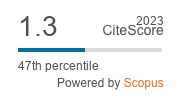SMEs innovation and job creation potential in the shadow economy context
DOI:
https://doi.org/10.2478/v10103-009-0048-xAbstract
The presented paper treats about the ability of creating new jobs by innovative SMEs in Poland in the age of a deep transformation of the Polish economy. The authors try to verify the concept of B. A. Kirchoff about the relationship between innovation and enterprise growth. Some sector and market conditions of functioning of innovative SMEs are also analyzed in the paper. A study among 81 Polish SMEs from Lodz region confirms that there is an independence between enterprise innovation and its ability to create jobs. On one side, among analyzed enterprises about 14% was highly innovative fast growing. On the other side, low innovative and slowly growing made a high percentage. The research pointed an important factor of the ability of job creation - sector and market conditions, management problems (lack of experience, problems with gathering the initial capital) and poor public support. The shadow economy has a positive impact on growth rather than on innovation. However, it does not have a positive influence on expansion, innovation and new jobs creation undertaken simultaneously, which is the most desirable activities of the enterprise.
Downloads
References
Baldwin R. E. (1995) The Effect of Trade and Foreign Direct Investment and Relative Wages, OECD Economic Studies, vol. 23
Google Scholar
Beloled O. (2005), Shadow Economy of Ukraine: A Case of Financial Constraints, National University Kyiv-Mohyla Academy, Kijów
Google Scholar
Calof J. (1994) The Relationship Between Firm Size and Export Behavior Revisited, ‘Journal of International Business Studies’, 2
Google Scholar
Central Statistical Office (2007), Rachunki narodowe według sektorów i podsektorów instytucjonalnych 2000-2005, Central Statistical Office, Warszawa
Google Scholar
Djankow S., Liberman I., Mukherjee J., Nenova T. (2002), Going Informal: Benefis and Costs, Word Bank, Working Paper
Google Scholar
Feel M. S. (2000), Do Small Innovating Firms Outperform Non-Innovators?, Small Business Economics, 14, p. 195-210
Google Scholar
Głodek P. (2008), Szara strefa - zakres pojęcia i podstawowe obszary badań, [in:] Edward Stawasz (ed.) Zarządzanie wzrostem małych i średnich przedsiębiorstw w kontekście szarej strefy, Lodz University Press, Lodz
Google Scholar
Hőlzl W. (2009), Is the R&D behaviour of fast-growing SMEs different? ‘Small Business Economics’ 33, p. 59-75 doi: 10.1007/s11187-009-9182-x
Google Scholar
Kalantaridis C., Pheby J. (1999), Processes of Innovation Among Manufacturing SMEs: The Experience of Bedfordshire, ‘Entrepreneurship and Regional Development’ 11(1), p. 57-78 doi: 10.1080/089856299283290
Google Scholar
Kirchoff B. A. (1994), Entrepreneurship and Dynamic Capitalism. The Economics of Business Firm Formation and Growth, PRAGER, Wesport, London
Google Scholar
Schreyer P. (2000), High-Growth firms and employment, STI Working Paper 2000/3
Google Scholar
Organisation for Economic Co-operation and Development (1998) Technology, Productivity and Job Creation, Vol. 2, Analitycal Report, The OECD JOBS STRATEGY, Paris
Google Scholar
Schneider F., Enste D. (2000), Shadow Economies: Size, Causes and Consequences, ‘Journal of Economic Literature’ vol. 38
Google Scholar
Sheikh S., Oberholzner T. (2001), Innovative Small and Medium Sized and the Creation of Employment, Final Report, ‘Inno-Studies 99 -Lot 9’, Vienna, October
Google Scholar
Stam E., Wennberg K. (2009), The roles of R&D in the new firm growth, ‘Small Business Economics’, 33, p. 77-89 doi: 10.1007/s11187-009-9183-9
Google Scholar
E. Stawasz (2008), Wpływ działalności w szarej strefie na funkcjonowanie i zarządzanie wzrostem w przedsiębiorstwach w świetle badań, [in:] Edward Stawasz (ed.) Zarządzanie wzrostem małych i średnich przedsiębiorstw w kontekście szarej strefy, Lodz University Press, Lodz
Google Scholar
Storey D. (1994), Understanding the Small Business Sector, Routledge, London
Google Scholar
Tether B., Massini S. (1998), Employment Creation in Small Technological and Design Innovators in the UK During the 1980s, ‘Small Business Economics’ 11(4), p. 353-370 doi: 10.1023/A:1008065115819
Google Scholar
Williams C. C. (2007), Small business and the informal economy: evidence from the UK, ‘International Journal of Entrepreneurship Behaviour&Research’, Vol. 13, No. 6
Google Scholar
Williams C. C., Round J., Rodgers P. (2009), Evaluating the motives of informal entrepreneurs: some lessons from Ukraine, ‘Journal of Developmental Entrepreneurship’, Vol. 14, No. 1
Google Scholar
Downloads
Published
How to Cite
Issue
Section
License

This work is licensed under a Creative Commons Attribution-NonCommercial-NoDerivatives 4.0 International License.










